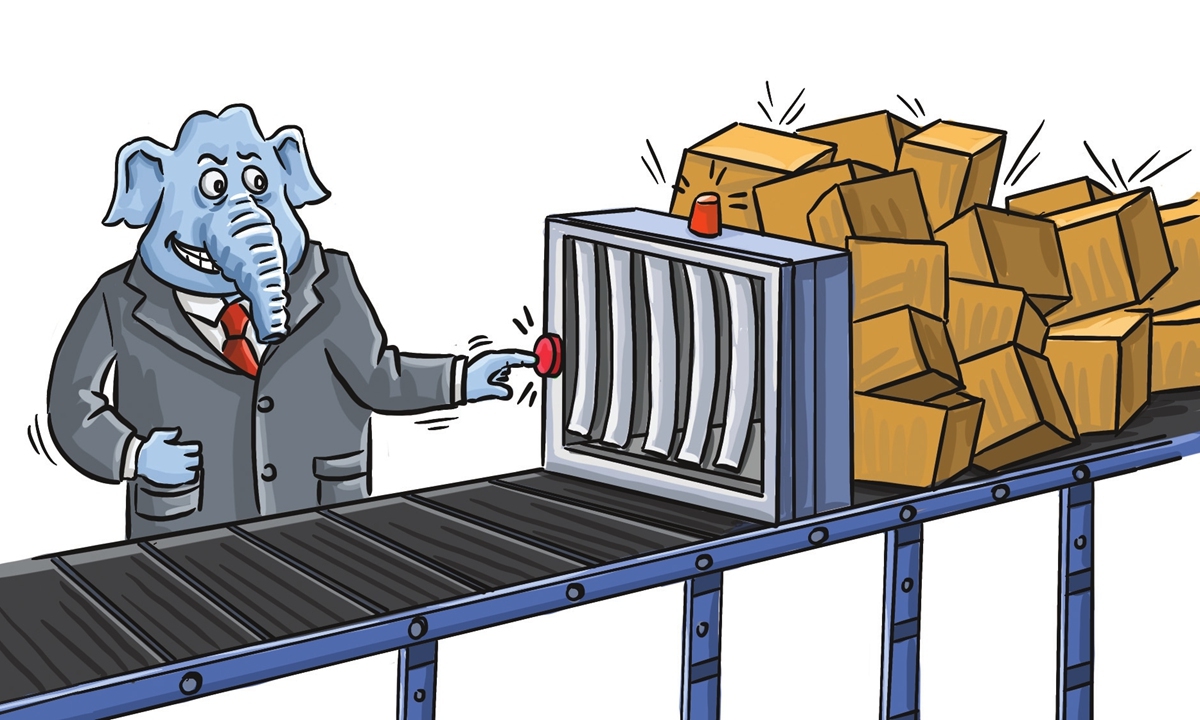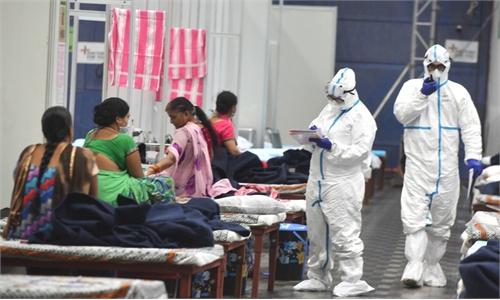COMMENTS / EXPERT ASSESSMENT
India can’t afford a ‘China decoupling’ as virus rages

Illustration: Xia Qing/GT
Since the beginning of this month, the COVID-19 pandemic in India has been spiraling out of control and is moving in a direction of great concern.India has seen record new cases every day since April 2. So far, the total number of cases in the country is second only to the 31.6 million cases in the US. With daily new cases growing at three times of the number in the US, so far this month, 2 million people have been infected in the South Asian country, and the number of new cases has remained above 200,000 for fourth consecutive days.
The rampant pandemic has overwhelmed the medical system in many parts of India, and the surging infections are causing a severe shortage of medical equipment and personnel. Delhi Chief Minister Arvind Kejriwal on Sunday said that Delhi is battling an acute shortage of oxygen cylinders as it fights to check the spread of the coronavirus disease. "If this pace continues then within the next two to three days, we will face a shortage of beds and other facilities," he said.
Moreover, if the number of new cases continues to increase sharply, the Indian government may have to implement another nationwide lockdown, which may further worsen the already troubled economy and cause a catastrophic humanitarian crisis.
Although India has returned to positive year-on-year growth in the third quarter of the 2020-2021 fiscal year (from October 2020 to December 2020), there are still great challenges for the country to make up earlier contraction, and the recent COVID-19 wave posed another serious hurdle.
In contrast, China has demonstrably contained the virus and moved quickly towards full economic recovery. China is offering assistance to more countries in fighting the virus and economic recovery.
China has become the most important exporter of ventilators. According to data from the Ministry of Industry and Information Technology, from March 19 to 30, China has provided more than 1,700 ventilators to countries with emergency need.
China has accumulated a lot of experience in the area of fighting the virus and promoting economic recovery, which can certainly help India's pandemic prevention and control. China also has the willingness to help India, but the main problem now is that India still holds a hostile approach toward China and even seek to avoid cooperation.
In recent years, India has tried to promote an economic decoupling from China. It wants to borrow the power of the US and other countries to contain China, and it has been increasingly tilting toward a dangerous direction after the border conflict with China last year.
India has banned more than 200 apps in China, and has increased discriminatory restrictions or even inciting economic nationalism against Chinese companies and investments.
Such moves might not be as helpful to local industries as some in India might think. If India loses its credibility in building and maintaining a fair and open business environment in cracking down on Chinese companies, it will also send chills among foreign investment and business from other countries, which will undoubtedly make India's economic recovery even more difficult.
India's decoupling path has obviously proven to be a mistake. China, as an important neighbor with a massive manufacturing sector and consumer market, is of great significance for India's industrial development.
The fault of India's decoupling policy is to ignore its economic needs and blindly serve its politics. New Delhi should embrace economic cooperation in accordance with economic needs, and should not politicize the livelihoods of its citizens. Decoupling will not only fail to succeed, but will also harm India's own industrial development in the long run.
India is currently at a critical juncture. If the country wants to get out of the predicament, it needs to actively promote cooperation with other emerging economies, including China, in fighting against virus and boosting economic recovery, rather than continuously playing geopolitical games.
The author is an assistant research fellow with the National Institute of International Strategy at the Chinese Academy of Social Sciences. bizopinion@globaltimes.com.cn


